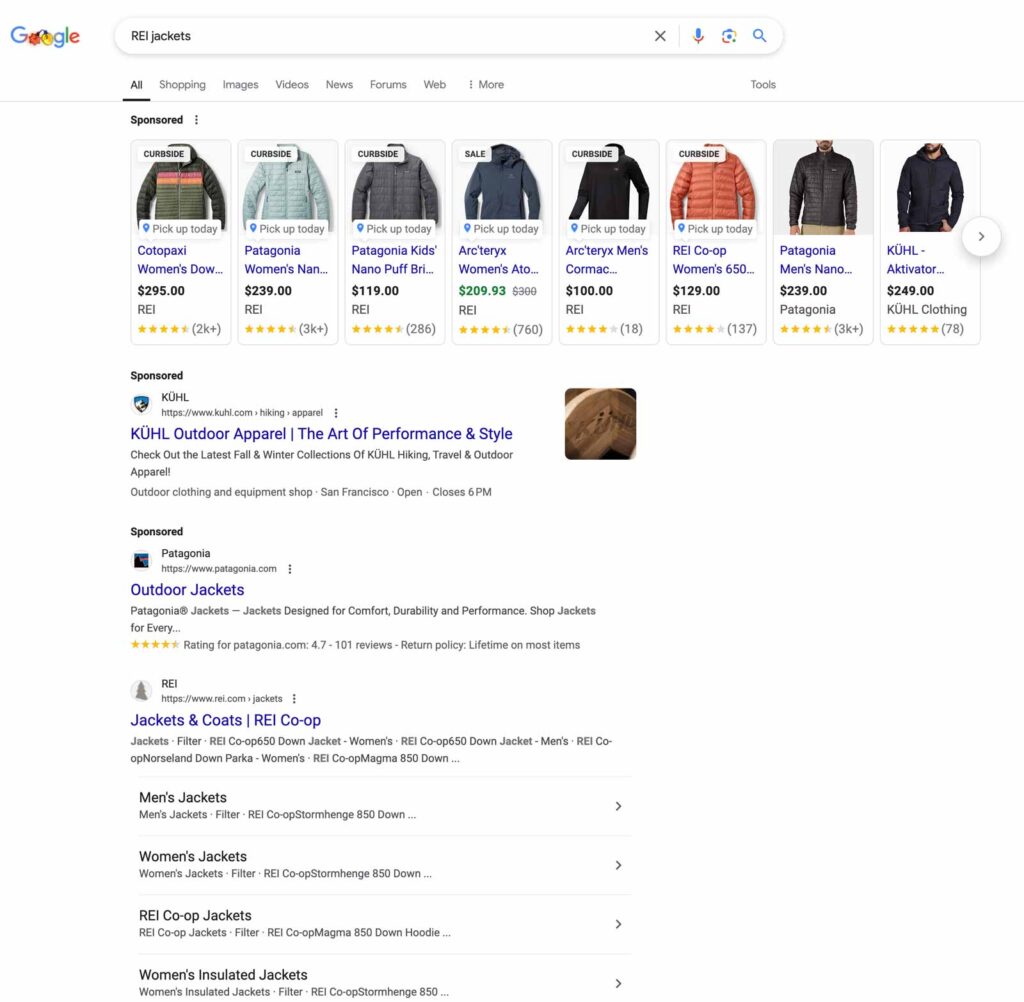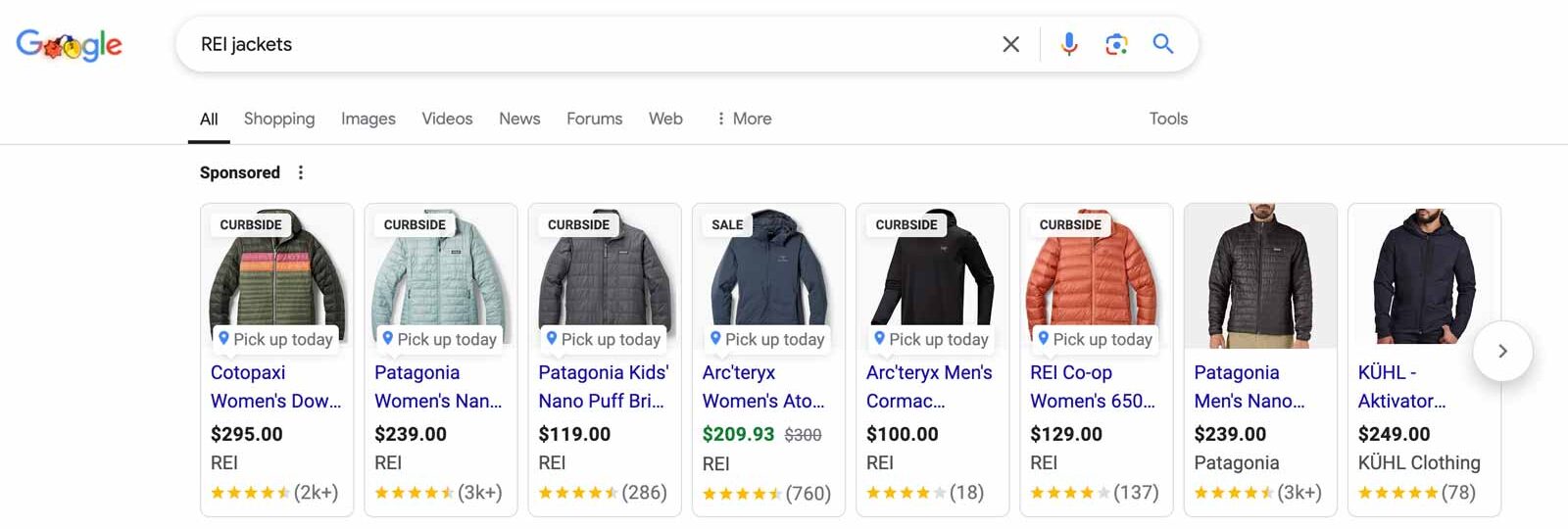Pros & Cons to SEM Brand Search Campaigns
When I was working as an SEO on the agency side, we would recommend bidding on your own brand name on paid search. The rationale was that you want to maximize the amount of real estate available on Google and Bing when someone searches for your brand name. Pretty sound logic I’d say. As the years have gone by as I’ve spent more than ten years working in-house my views on brand SEM campaigns have evolved.
Competitor Search Campaigns
When there are other companies bidding on your brand name, especially if it becomes a measurable amount (not just from random personal searches but also registers under Google Ads Auction Insights) then I would almost always recommend bidding on your own brand terms. Brand terms are always going to be your highest converting search terms because that is pre-qualified traffic whether it’s from a returning customer or at least from someone with some sort of interest in your brand. In most situations it is not that hard to defend your brand name from competition by spending a little bit of money because Google will almost always give you a much higher Quality Score than what a competitor would receive. Competitor search campaigns can have high CPC’s as a result.
When you don’t bid on your own name and others are then you’re making it a lot easier and less expensive for someone to start taking business from you. One company that I managed SEM for as a freelancer was adamant about not bidding on the brand name. When presented with evidence that competitors were bidding on the brand, the company shrugged and said they didn’t care. You can’t win every argument but I stand by my position to this day.
Let’s use an example here. Notice how REI has Google Shopping ads when I search for “REI jackets” with just one shopping ad each for Patagonia and KUHL. However for the traditional paid search ads, KUHL and Patagonia are able to push the #1 ranked organic search SEO result into what is essentially the #4 position on the SERP. If a user doesn’t engage with the shopping ads at the top then there’s a reasonable chance the user might click on the competitor ad. REI could easily bump the competitors off of the top slots if they had a traditional paid search brand ad displaying here.

Cons to Bidding On Your Brand Terms
One of the downsides to bidding on your own brand terms is that it comes at the expense of organic search traffic. The reason for this is that it pushes the organic results which you likely rank #1 for already further down the page so the click-thru rates (CTR) is reduced. This is not necessarily a bad thing to a certain extent. I will explain why this is later on.
Another thing to consider is how much is your SEM ad budget? For brands with high search volume you can spend a significant amount of money trying to maximize share of brand impressions. No company has infinite resources so is your brand search spend coming with the opportunity cost of non-brand search and other paid campaigns?
Which brings me to a point that is lost on some people. Given that people who bid on your name have much higher conversion rates due to brand awareness and purchase-intent, how much incremental value is brand search adding to your business? Would you have gotten this business without bidding on your own brand name? For more than one of the brands I was managing, I noticed that for every dollar spent on SEM brand terms it would come with huge decreases in organic search CTR for those same terms. The reason for this is that a lot of times, we were just bidding against ourselves which resulted in cannibalization with no incremental value. We were getting a lot of paid search clicks for very little money. The competition was mostly doing seasonal bidding.
Measuring Paid Search Incrementality
There are numerous ways to measure incrementality which go beyond what I can cover here but in the context of search, it’s about what is the combined CTR of your brand search on organic and paid search. You can expect a hit to organic CTR and traffic when bidding on your own brand terms. How much is an acceptable amount is the question. I view brand search campaigns as a defensive mechanism more than as an acquisition strategy. Paid brand search is also a way to manage the narrative around your brand but that’s besides the point.
How we structured the test was by turning off all Google Ads brand search campaigns for a month then monitor the brand search traffic and CTR in Google Search Console (GSC) for changes. I immediately saw huge spike in CTR and organic search traffic in GSC. When we turned the ads back on the next month, I saw a corresponding drop back to where we were previously. The trick to balancing this is determining where the sweet spot is for SEM brand spend when it comes to blended organic and paid search CTR.
Navigating Corporate Hierarchy & Office Politics
Depending on how your company is structured, the SEO and SEM teams might be silo’ed and managed by different groups or people. That can be a tough structure to crack especially since marketers are often incentivized to meet their own specific KPIs for performance reviews which impacts promotions and bonus payouts. Getting cross-functional collaboration like that is challenging unless you can get senior leadership to steer in the same direction.
A more ideal scenario is the one that I described above. I was responsible for both organic and paid traffic so I could manage my team according to what was best for the company. Many people in this industry tend to specialize in either organic or paid as it’s not as common to have expertise in both. I’m fortunate in that regard in that I’ve spent more than ten years managing both simultaneously so I had access to all of the data to make these decisions.
Back to the original question: Should you bid on your own brand name? Probably. Just take a holistic view of the situation then decide what is the right amount.
